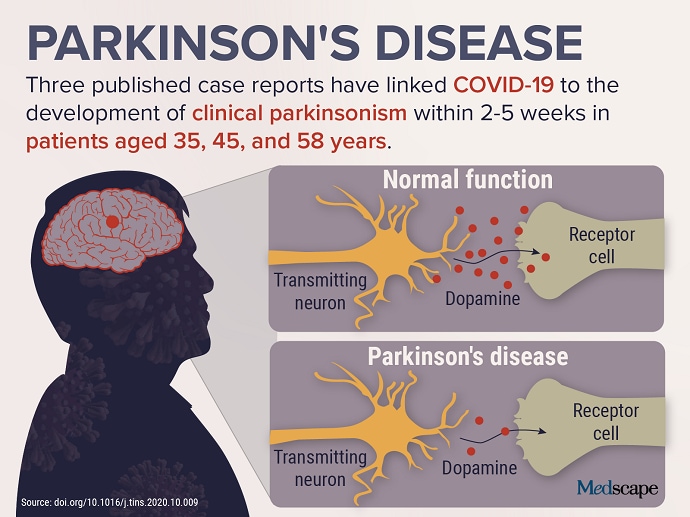Trending Clinical Topic: Parkinson’s Disease
No Results
No Results
Each week, we identify one top search term, speculate about what caused its popularity, and provide an infographic on a related condition. If you have thoughts about what’s trending and why, share them with us on Twitter or Facebook. Find the latest COVID-19 news and guidance in Medscape’s Coronavirus Resource Center.
From a reported link to COVID-19 to new options for diagnosis and treatment, several significant recent news items made Parkinson’s disease this week’s top trending clinical topic. A recent article examined the mechanisms potentially at play in three relatively young patients with COVID-19 who developed clinical parkinsonism (see infographic below).
For two of the three, parkinsonism symptoms diminished after administration of traditional dopaminergic medication. The third patient recovered spontaneously. In all cases, brain imaging showed reduced function of the nigrostriatal dopamine system, as is seen in Parkinson’s disease. None had a family history of the condition, and one patient underwent genetic testing and was found not to carry any of the risk variants.
The authors of the article believe that COVID-19 may predispose patients to develop Parkinson’s disease either sooner or later. Although these cases do not prove a causal relationship between the two conditions, the researchers say the potential of long-term neurologic sequelae supports the idea that COVID-19 should be treated as aggressively as possible.
In terms of preventing Parkinson’s disease, a new study suggests that coffee consumption is associated with a reduced risk in a particular subset of individuals. The study showed that caffeine levels were lower in patients with Parkinson’s disease compared with controls, but this difference was much greater in individuals with a mutation in the leucine-rich repeat kinase 2 (LRRK2) gene. The authors suggest that if the findings are confirmed in additional studies, caffeine-related therapies may help reduce the development of the condition in individuals with the LRRK2 mutation.
A separate study recently investigated how gene variants may affect Parkinson’s disease risk after pesticide exposure. Findings suggest that the likelihood of developing the condition is associated with prior exposure to occupational pesticides, both with regard to sporadic cases and among patients who have a GBA genetic risk variant for Parkinson’s disease. This association was not as strong for the LRRK2 risk variant. Pesticide exposure was also associated with cognitive decline, especially for carriers of the GBA variant, the researchers noted.
In more encouraging news, Parkinson’s disease may soon be diagnosed using a skin test. Researchers used a chemical assay to detect clumping of the protein alpha-synuclein, which is a hallmark of the condition, in autopsy skin samples. Those samples were taken from patients whose condition had been confirmed by brain pathology. The skin testing showed a high degree of sensitivity and specificity for the diagnosis of Parkinson’s disease. If the current results are replicated in live patients, the skin test could facilitate quicker diagnosis and the ability to start preventive treatments that slow disease progression before severe symptoms develop.
A new development in treatment has also received recent attention. A study found that apomorphine sublingual film was efficacious and generally safe and well tolerated for the on-demand treatment of off episodes in Parkinson’s disease. Although the sublingual film had more oral adverse effects than the injectable form, it may offer some advantages in terms of administration during off episodes. For example, the new formulation is more convenient than carrying an injection, as it comes in a small, tear-open packet that contains a medication strip the patient places under their tongue.
From COVID-related concerns to new developments in prevention, diagnosis, and treatment, various findings contributed to Parkinson’s disease becoming this week’s top trending clinical topic.
Read more clinical information about Parkinson’s disease.
Medscape © 2020 WebMD, LLC
Any views expressed above are the author’s own and do not necessarily reflect the views of WebMD or Medscape.
Cite this: Ryan Syrek. Trending Clinical Topic: Parkinson’s Disease – Medscape – Nov 20, 2020.
Senior Editor, Medical Students, Medscape Drugs & Diseases
Disclosure: Ryan Syrek has disclosed no relevant financial relationships.
You have already selected for My Alerts
Click the topic below to receive emails when new articles are available.
You’ve successfully added to your alerts. You will receive email when new content is published.
processing….
Trending Clinical Topic: Parkinson’s Disease
Research & References of Trending Clinical Topic: Parkinson’s Disease|A&C Accounting And Tax Services
Source

0 Comments